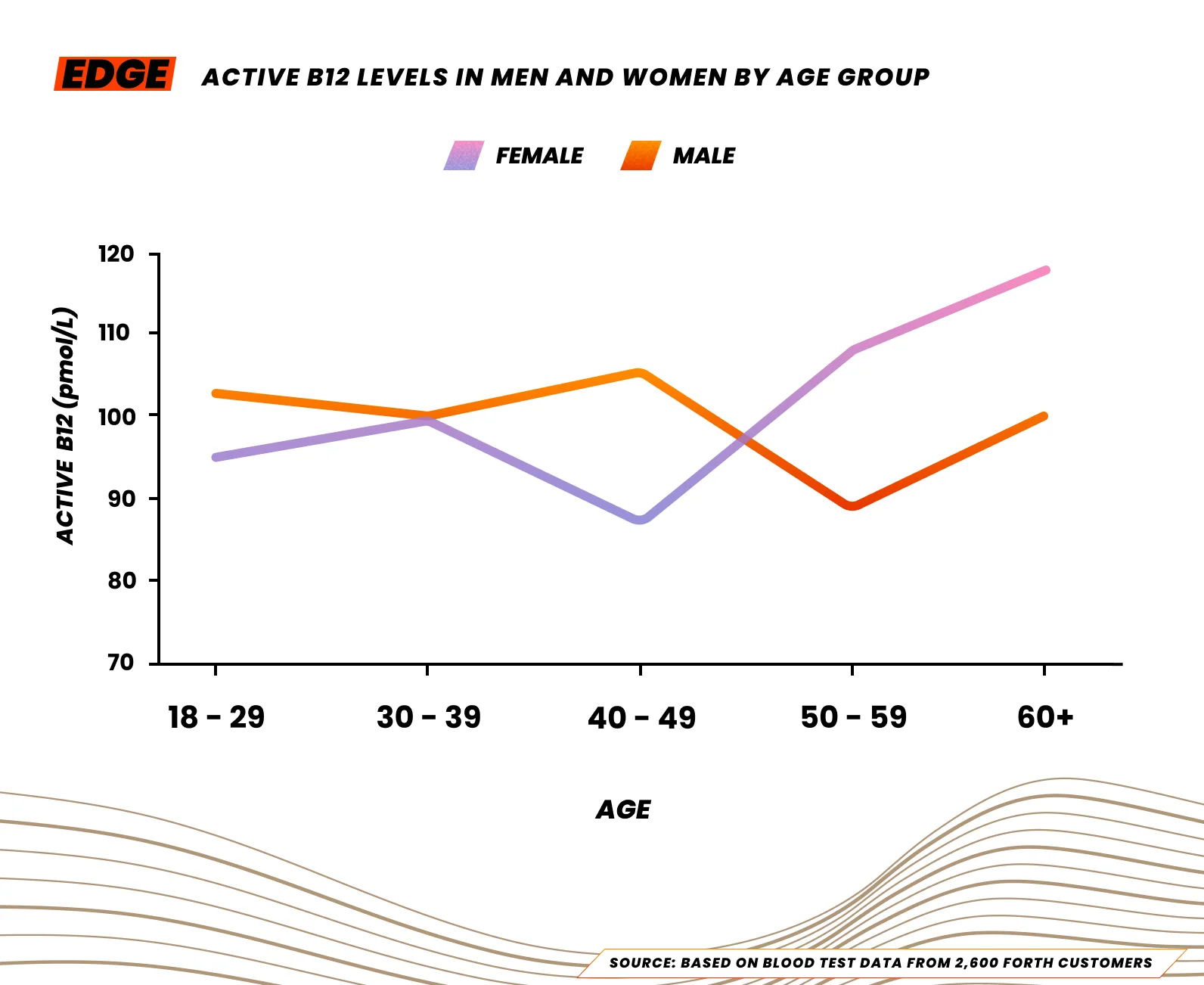What is Active B12 & why is it important for athletes?
1 min read
Published on
May 22, 2025
Written by
EDGE
Share this article
What is Active B12?
Active B12 is the bioavailable form of vitamin B12 and is needed for red blood cell production, nerve function, and energy metabolism, all of which are an essential part of athletic performance.
For athletes, a deficiency in active B12 can result in fatigue, muscle weakness, reduced endurance, poor coordination, and even brain fog. These symptoms are often misattributed to overtraining, when in reality they may stem from an underlying nutritional imbalance.

"Active B12 is essential for red blood cell production and energy metabolism. For athletes, maintaining optimal B12 levels helps support oxygen delivery to muscles and reduce fatigue. I recommend testing every 3–6 months, especially if you follow a plant-based diet, as dietary intake may be limited. Testing alongside folate and ferritin gives a more complete picture of your body's ability to produce healthy red blood cells and maintain energy levels."
How Active B12 Affects Performance
-
Oxygen Delivery & Endurance
B12 is vital for the production of healthy red blood cells. Without enough of it, oxygen delivery to muscles drops, directly impacting your stamina, endurance, and recovery.
-
Muscle Function & Recovery
Athletes with low B12 may experience frequent cramping, slower muscle repair, and a longer recovery window post-training. This slows progress and increases your risk of injury.
-
Nerve & Cognitive Health
B12 supports nerve signal transmission and brain function. A deficiency can lead to tingling limbs, balance issues, and decreased mental focus, which are all detrimental during training and competition.
What are normal active B12 levels for athletes?
We looked at blood test data from EDGE customers and found the median active B12 levels for men and women are 100 pmol/L and 96 pmol/L, respectively.
Here is a breakdown of active B12 levels by age and gender:
| Table 1: Active B12 Levels in Men and Women by Age Group (pmol/L) | ||
| Age Group | Female | Male |
| 18-29 | 95 | 103 |
| 30-39 | 99 | 100 |
| 40-49 | 87 | 105 |
| 50-59 | 107.5 | 87.65 |
| 60+ | 117 | 100 |
Source: 1,458 EDGE customer blood test results Apr 2023 – March 2025.
The labs we used to analyse blood samples state a healthy range for active B12 is between 37.5 pmol/L and 188 pmol/L.

Who’s Most at Risk?
-
Endurance athletes with high metabolic demand
-
Vegetarian or vegan athletes, as B12 is mostly found in animal products
-
Older athletes, who may absorb less B12 due to age-related digestive changes
-
Athletes with digestive conditions (e.g. IBS, coeliac) affecting nutrient absorption
Why Testing Matters
Symptoms of low B12 can be subtle but performance-limiting. Regular testing can help you:
-
Detect early signs of deficiency
-
Prevent avoidable dips in performance
-
Make informed dietary or supplement choices
-
Ensure recovery and energy systems are fully supported
Active B12 testing is more accurate than total B12 tests, giving a true picture of the bioavailable B12 circulating in your bloodstream.
Sources of Active B12
-
Animal-based: liver, red meat, fish, dairy, eggs
-
Fortified plant-based foods: cereals, plant milks
-
Supplements: especially important for vegans or those with absorption issues
Should You Supplement?
While most athletes can meet their needs through diet, supplementation may be necessary if you have a dietary restriction or poor absorption. Oral B12 supplements are typically effective, though in some cases sublingual (sprays) or injectable forms may be recommended.
B12 injections are sometimes marketed as performance boosters, but unless you’re clinically deficient, there’s little evidence of additional benefit. Testing before supplementing is key.
In Summary
-
Supports red blood cell production - Better oxygen delivery and endurance
-
Essential for nerve and muscle function - Reduced injury risk and quicker recovery
-
Vital for brain function - Improves focus and reaction time
-
Risk of deficiency is higher in plant-based athletes
-
Testing ensures you're not leaving performance on the table
Test your Active B12 levels regularly — it's a simple step that can make a big difference to your training, recovery and results.
Check Your Active B12 Levels
Check and monitor your active b12 levels from home with our sports blood tests.
Get 10% off your first order
Want regular tips on how to make the most of your results? Join our newsletter and we'll give you 10% off your order!
Get the knowledge
Get expert advice to help you improve your results.
Go to our knowledge center


